
President trump could improve relations with Russia without compromising American national interests by returning to the fundamental principles of the cold war. The main duty of American presidents to protect and defend the Constitution of the United States of America. In a world where the Russian leader has a nuclear Arsenal that could wipe US off the face of the earth, a prerequisite is an effective (and often politically painful) cooperation to avoid such an outcome. Today, as in the cold war era, the Americans and the Russians share a common vital national interest, which is to prevent nuclear war.
For many people today it’s obviously gonna sound like an anachronism. In principle, at the end of the cold war in 1991, the majority of Americans sent a nuclear weapon, and with it the Soviet Union, to the dustbin of history. But this approach was a dangerous delusion. The Soviet Union disappeared, and the Arsenal of a superpower, of course not. In General, the half-life of plutonium is 24 thousand years, so nuclear weapons are not going anywhere for some time.
Contemporary discussions about “punishing” Russia for interference in the presidential elections of 2016 or “impose sanctions” against Russia for destabilizing the situation in Eastern Ukraine or “combat” operations of the Russian military through the placement of additional U.S. troops and NATO in the Baltic States — all this is in no way related to the basic question: what then? What will be the response of Russia? And feel whether or not Americans are safer than before, at the end of the whole sequence of actions and reactions? Even Bismarck warned against such strategies.
In the midst of the cold war, Ronald Reagan dubbed the Soviet Union an “evil Empire” and was determined to overcome it. At the same time, he acknowledged, as he often reminded of “knights of the cold war”, that “a nuclear war cannot be won and therefore should not lead”.
It was of fundamental importance from the point of view of US strategy. If America for some reason was in a state of General nuclear war with the Soviet Union, she totally would have annihilated the enemy, and Vice versa. This was exceptional and categorical requirement of safeguards to prevent nuclear war.
If, for example, from one of the States an accidental missile launch with a nuclear warhead, or one of the States would be drawn into the war due to an error in calculations, or in the event of war with conventional weapons transfered into nuclear Armageddon, the losing party would have been America. If Russian leaders behaved recklessly — as did Khrushchev in an attempt to place Cuba’s nuclear weapons, and this would lead to a nuclear war, would seek solace in the opportunity to blame them, but in the end Washington would have suffered catastrophic losses.
Technology, in fact, has turned Russia into unbearable but inevitable Siamese twin of America. Strategic reality inspires even greater fear. Whichever diabolical, destructive, cunning and worthy of punishment was not Russia, the facts tell a suicidal mission to destroy it.
Strategists of the cold war, found that survival in such conditions requires the formation of competition around five factors: diligence, communication, constraints, compromise, and cooperation. The recognition that even the randomness can trigger the launch of doomsday, has infused in people’s care. Communication in a deadly rivalry and growing incomprehension of a challenge, too, is not. To paraphrase the current Vice-Chairman of the joint chiefs of staff Paul Selva, the most reliable way of promoting ambiguity, whether in human relations or in international Affairs, is the interruption of the contacts. Limitations on potential initiatives, particularly in the context of military exercises has been recorded as unspoken “rules of the status quo” and clearly formulated agreements on arms control, which became the result of negotiations in which each party motivated only by personal gain. A compromise — not only with the aim of reaching agreement, but in acceptance (for a long period of time) of the facts which under other circumstances would be considered unacceptable (such as Soviet domination over the enslaved Nations of Eastern Europe) was considered a necessity in order to avoid direct conflict between the major military branches, as it could escalate into war, to avoid which was the top priority. And finally, this is meant as tacit and explicit cooperation in which each party could achieve more than alone — including, for example, joint efforts to prevent the proliferation of nuclear weapons.
President Obama came to power with big ambitions on the “reset” of relations with Russia and reducing the role of nuclear weapons in international Affairs. But when eight years after he left office, relations between the US and Russia was at such a low, such as never was since of the extreme decadence of the era of the cold war, and the possible use of nuclear weapons in Europe has again become a subject of controversy. Although there is no doubt that a large part of the blame for this outcome rests with Putin, from the point of view of Americans the most important point is the level of their protection in comparison with the situation eight years ago. What led Obama’s policies on the “demonization of Putin”? Lowered or raised Washington level of risk, punishing Russia for its unacceptable aggression against Ukraine by means of breaking contacts and cooperation with Moscow, including joint action to secure nuclear weapons and materials in Russia and other countries, as well as communication lines between the commanders of forces in Europe and the middle East, whose forces acted in close proximity to each other?
President trump has the ability to increase the safety of Americans by a radical change of the above-mentioned initiatives of Obama and “melting” of relations with Russia on the basis of the fundamental principles of the cold war.
Graham Allison, a former Director of the Belfer center for science and international Affairs at the Kennedy School at Harvard University and author of Destined for War: Can America and China Escape Thucydides”s Trap?







